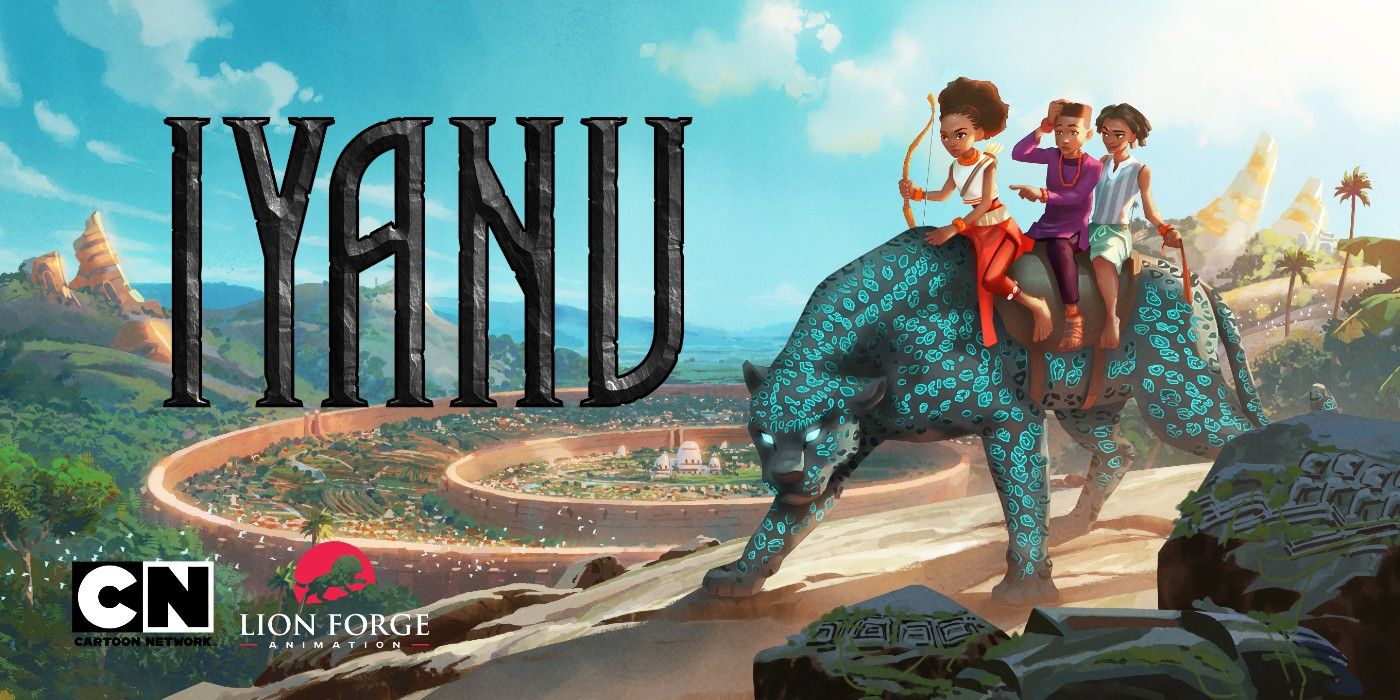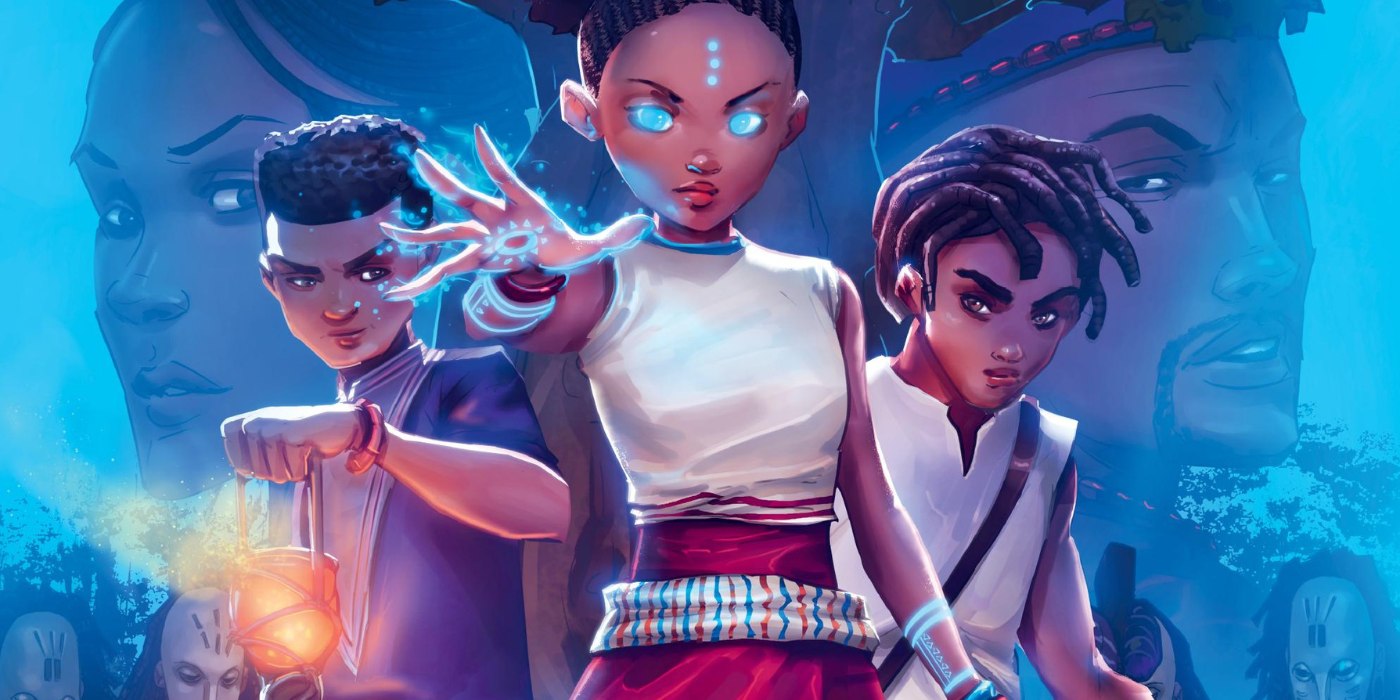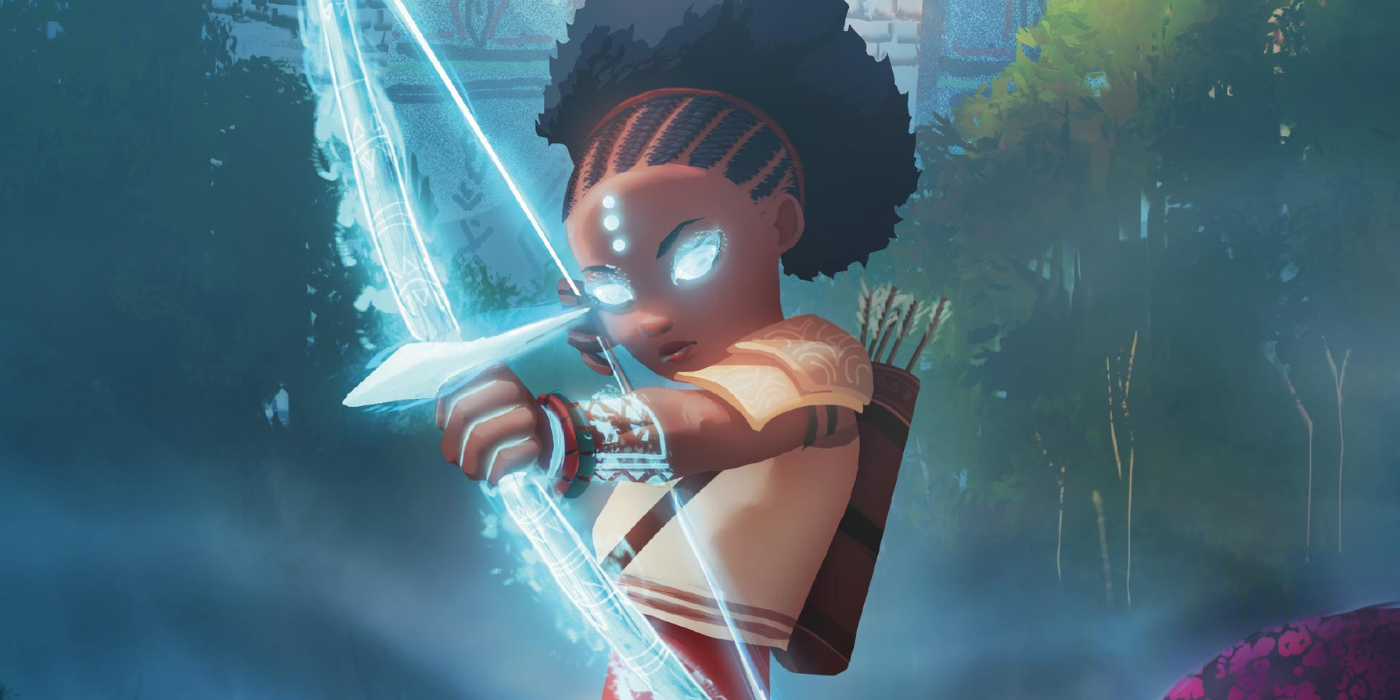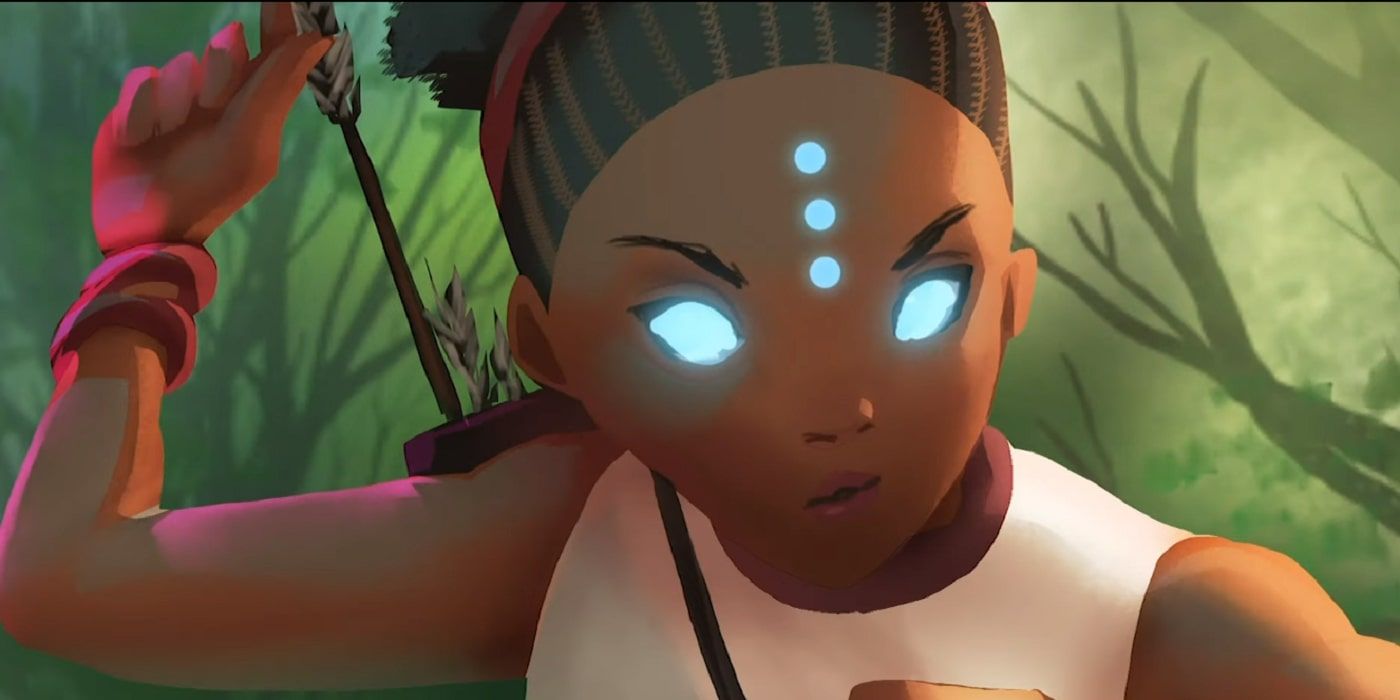Based on the graphic novel series from writer Roye Okupe and artist Godwin Akpan, HBO Max and Cartoon Network's upcoming Iyanu: Child of Wonder will be heavily influenced by the Yoruba people of Nigeria. Financed and overseen by Lion Forge Animation, the 2024 animated TV series chronicles the tale of Iyanu, an orphaned teenage girl with no memories of her upbringing who yearns for a simple, normal life. Those dreams get shattered when a set of circumstances triggers Iyanu's dormant divine abilities. Teaming up with two other teenagers, Iyanu embarks on a quest to confront the Corrupt, a great evil rising in their homeland that threatens humanity. Along the way, Iyanu will slowly uncover the truth about her past, parents, powers, and destiny as the Chosen One.
The epic superhero adventure promises to draw from Nigerian culture, music, and lore. In addition, creator Okupe has written and directed multiple episodes. Lion Forge's head of production Saxton Moore, who serves as supervising director, and executive producer David Steward II recently spoke with CBR about adapting the graphic novel, cultural representation, Iyanu's quest, and anime influences.
CBR: How did this character and property land on your radar?
David Steward II: It was kind of serendipitous in a couple of ways. I met Roye [Okupe] a couple of years ago, actually, before he created Iyanu. We had been trying to work together. We were going through mergers and some other stuff, so unfortunately, that part didn't quite work out for us. We always maintained that we wanted to do something together. The project ended up coming full circle. Between us hiring Saxton and his relationship with Forefront and our relationship with Roye, this thing ended up coming together. We were like, "Oh, we are working this. This is awesome." It's been a great partnership working with him. Our values, the way we go about thinking about this content and the meaning of it, [are] so much aligned. He knows that we have the intentionality of making sure that not only is his creative voice heard through this project, but the authenticity is there.
Saxton Moore: Roye is an amazing storyteller. He has been making books for quite some time now. I have been a big fan of some of his other titles. When Forefront came to us with the concept, I knew it was time. It was so strange how I came into Lion Forge. Roye and Forefront came in. It all started falling together. People started falling into place. The team came together. It was like it was meant to be.
What were some of the specific elements that spoke to you about Iyanu and this world?
Moore: The African culture. For me, with the success of Black Panther and what that brought to the table and the attention it brought to Africa in general, it was very cool. The issue there is Wakanda is a made-up place. We are actually bringing authentic folklore from Nigeria into a project, which is very interesting. If you look at the folklore we all know in the U.S., it's all built on Greek, Roman, or other European folklore. There's even Viking stuff and Thor, but nobody has really brought on the folklore, history, or heritage from this continent.
There was a little bit of Anansi in American Gods. There is a little bit of that threaded in there and the graphic novels, as well, but nobody has really looked at those stories in a meaningful way. This is a great opportunity to shine a light on that storytelling. Hopefully, that ignites interest in other stories from other countries.
How much do you feel Black Panther and American Gods opened doors for you? Did they make it easier to get this project in development?
Moore: I think it started with Hair Love, [Spider-Man: Into the] Spider-Verse, Black Panther... they were just rolling out the red carpet. I was super excited. The thing about Black Panther is that people came out in droves because they were hungry for something like that. We are still starving afterward. We have a way until another Spider-Verse or Black Panther came out. I feel the more, the merrier. Those things paved the way for us.
Steward: To your point, I think Hollywood has definitely changed. I remember seven or eight years ago. I can't remember the name of the movie, but there was a movie about Egyptian gods [Gods of Egypt]. There weren't any Black people. It was an all-white cast. Everybody was looking at it, going, "So, these are Egyptian gods and an all-white cast? What's going on here?" The director straight up said, "Listen, if I had cast this any other way, this wouldn't have gotten made." That was the reality of that time period. I think over the last few years, really, with these projects like Black Panther, as well as the social justice movement in general, it's put people on notice in terms of looking into this content in an authentic way and being able to understand there is great viability in these African-led properties.
When you got your hands on the source material, how challenging was it to adapt it to another medium? What were some of the things you felt needed to make it from the page to the screen?
Moore: It's an adventure story, but seeing series like Avatar and Legend of Korra, those were based on fictitious places. Now, we are sourcing from Nigerian culture. Now, we have an adventure story spawning from a real place, from an ancient time. The world is your oyster. Having a young girl as the lead hero, who is destined to become the Chosen One and save the people... We never deviate from the fact that she is a young girl. Roye and Godwin [Akpan], the artist of the book, did a fantastic job of telling the story.
It's easy for me to picture how this goes from the page to the small screen. You are stuck on the comic pages, and now, we get to expand on that and really give breath to the story and make it more emotional. We have time to take focus on some of the things they didn't do in the book. Right now, we are ahead of the book.
Steward: What I will add to that is kudos to the writers' room, to Brandon Easton who is leading the writers' room. A lot of times, things get adapted without the artist involved or the original creator involved. It becomes a weird interpretation of the artist's intent. In this case, Roye sat in with the writers and looked at scripts. We have him intimately involved in the process. Everything you see there has that artist's intent engaged in it. When the series rolls out, we will be ahead of the books, but it's all based on Roye's creative [ideas]. We are not deviating too far.
Can you introduce us to your young heroine, Iyanu, and a bit of the journey she finds herself on?
Moore: Iyanu is kind of like a coming-of-age story. Just like in the books, from the very beginning, she doesn't really know her true roots. She is not familiar with who her parents were. She has a mother figure who is mentoring her. She knows she has these abilities, but she doesn't have control of them. Throughout the series, her journey is to find her roots, literally, and also harness her powers, so she can go into the role of the Chosen One.
What kind of stories can audiences expect? Are they all standalone episodes, or is it a serialized story? Is there a big bad for the season?
Moore: This is an ongoing story, similar to the Avatars and the epic journeys like Star Wars. We will follow her journey from the beginning. She will discover her powers. She has mentors. There is one big bad that reveals himself. I can't say too much about who it is because I would be spoiling things. There is one big bad that shows up, and then the real big bad shows up near the end of the season. You think there is one villain, and then there are two. She is up against great odds.
How does Iyanu wrap her head around possessing these extraordinary powers?
Steward: In the beginning, she doesn't believe she is the Chosen One. She just wants to be a normal girl. If you look at the books, she starts off on the outside of the city. She's almost like an outcast. Her mother figure, her mentor, is an outcast as well. They live on the outskirts. They live in the forest, away from the city. She desires to be a regular kid, just like the kids on the inside of the walls. When she's forced to go find her roots and [is] separated from her mother figure, she's on her own. She doesn't know how to control her powers. She doesn't want to be the Chosen One, and she's forced into that position by having to be on her own. She has natural abilities, unnatural abilities, and supernatural abilities. Not only does she have to learn how to live with her powers collectively, she has to control all three.
How would you describe the animation style?
Moore: With the animation style, we want to achieve that comic book feel, but we want to have a level of quality similar to what is done in anime. We want to have epic fight scenes that correspond with the pacing of the show. I want to praise Saxton for leading the creative team in the execution on this. The intention of this is to chart a new paradigm. We are taking the influence of anime, but in the sense of anime has defined what Japanese animation is. In the same way, we are trying to define a new artistic direction for what we do as a company.
How important is it for other kids to see this representation on screen?
Steward: It is very powerful. Again, going back to work that we have done starting with Hair Love, I can't tell you the outpouring of emotion that parents have... to be able to have something for their kids that they can see themselves in. With Rise Up, Sing Out, for example, we had the Super Bonnet song, and it went semi-viral. There are cases of little girls who didn't want to wear their bonnets, and they were like, "I am going to wear it now. I think it's cool." It's a way to showcase elements of culture and teach other people outside a race. It also helps to normalize elements of Black culture for everybody. Again, those girls were not seeing these elements anywhere else. To see these figures in different lights, it not only bolsters the people that are watching but also helps to change the narrative around how do I see others?
Look for Iyanu: Child of Wonder in 2024.




